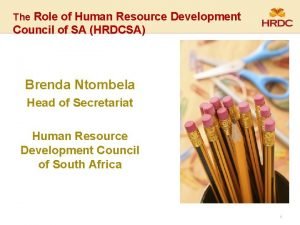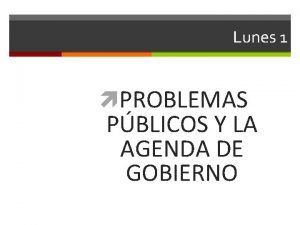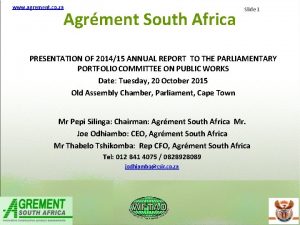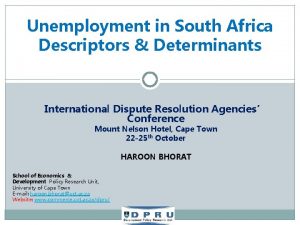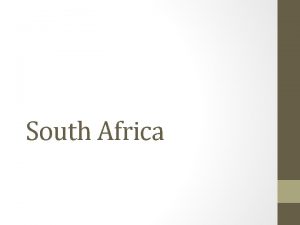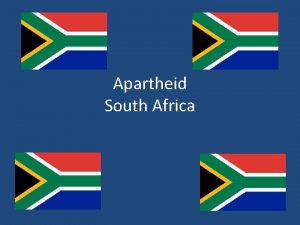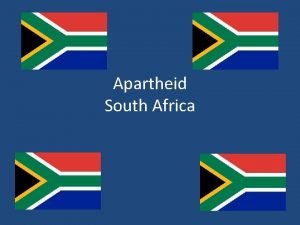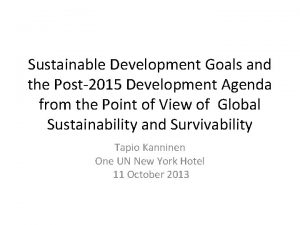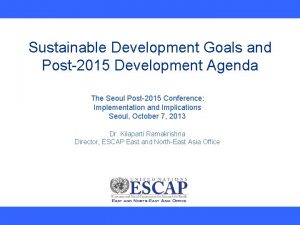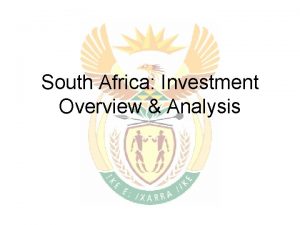The Post2015 development agenda in South Africa Peliwe










- Slides: 10

The Post-2015 development agenda in South Africa Peliwe Lolwana Centre for Researching Education and Labour (REAL) University of Witwatersrand

Presentation outline 1. South Africa’s involvement 2. MDGs and the country’s education agenda 3. A Post-2015 agenda for South Africa 4. The Government’s initiative 5. Priorities in South Africa 6. Conclusion

1. The development of the Post 2015 Agenda • • • The secrecy and non-transparency of the process A big Tsunami in the North and a small ripple in the South (King & Palmer, October, 2013) The Aid - NGO connection and the Post-2015 Agenda. The absence and low profile of the big NGOs in South African education scene The MDG agenda as a schooling issue and the silence on Skills Development as well as Higher Education

2. MDGs and the country’s education agenda • • Access and quality education priorities at start of the new government Like the post-2015 agenda, RSA has been marginally involved Issues of access have been important to the new government irrespective of MDGs and access to basic education has been universalised (8 years of schooling) a long time ago Quality and Equity are issues to be taken forward to the post-2015 agenda by the country

3. A Post-2015 agenda for South Africa • • • Realising that the Post 2015 agenda speaks to Education and Training through Goals 3 and 8; Realising that SA has a bulging population of young people outside of education, training and employment; Realising that education and training does not translate to employment; Realising the interactive impact of Education; Dwellings and Employment on Poverty Realising the intractable problem of spatial inequalities in our society and how this plays out in education and skills developmet

4. The Government’s initiative • • • Department of International Relations and Cooperation (Foreign Affairs) workshop in September 2013 –coordinating various departments’ responses Department of Higher Education and Training coordinating the Skills Development and Higher Education responses through inputs by a small group No wider discussion in the country still. Doubtful if government is doing any work further in Post-2015 agenda

4. The Government’s initiative • • • Department of International Relations and Cooperation (Foreign Affairs) workshop in September 2013 –coordinating various departments’ responses Department of Higher Education and Training coordinating the Skills Development and Higher Education responses through inputs by a small group No wider discussion in the country still. Doubtful if government is doing any work further in Post-2015 agenda

5. Priorities in South Africa 1. The inequalities in accessing and succeeding in post-school institutions in the country is a problem 2. Transition of young people to meaningful participation in society is a large problem and still race based 3. Problems in establishing a meaningful skills system: A skills system is about understanding the skills demand; establishing an appropriate skills development and deployment systems

Priorities in South Africa 4. Absence of a system of moving large individuals from elementary jobs up the ladder of occupations. 5. Difficulty in redistributing the spending of income from the fiscus to serve social and economic purpose as well as support economic growth at family levels

4. Conclusion • • • It is important to engage in the global debate about MDGs but can never drive the developmental agenda of the country It is important to understand where we will be as country at the end of the MDG 2 s and build on this momentum Perhaps South Africa should focus on addressing its priorities first and the post-2015 agenda will take care of itself.
 Definition of community development
Definition of community development Human resource development council of south africa
Human resource development council of south africa Agenda sistemica y agenda institucional
Agenda sistemica y agenda institucional Agrement south africa
Agrement south africa Herbalife millionaire team salary in south africa
Herbalife millionaire team salary in south africa South africa unemployment rate by race
South africa unemployment rate by race Naki naki getto
Naki naki getto Doctrine of unjust enrichment
Doctrine of unjust enrichment Southwest asia and north africa map
Southwest asia and north africa map 11 official languages of south africa
11 official languages of south africa Musket
Musket

